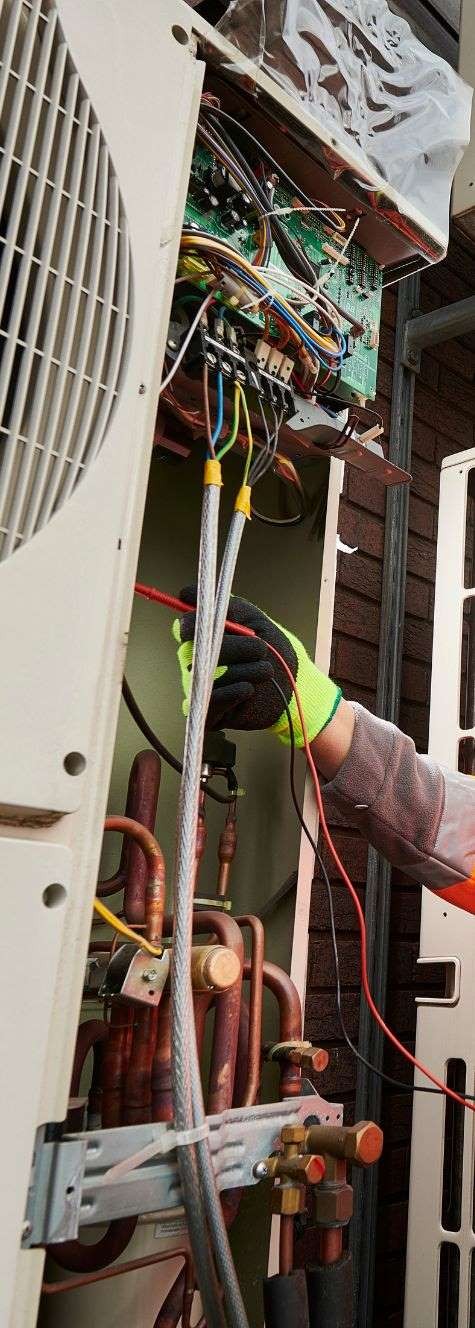As an HVAC contractor you install or repair heavy systems, work with electrical wiring, and face unique risks. Without insurance, your small business may face costly financial losses due to unexpected events. While there isn’t a specific policy called “HVAC business insurance,” most HVAC businesses can benefit from general liability and commercial auto insurance.
Business insurance for HVAC contractors can be customized to their needs. Additionally, it may cost less than other high-risk sectors such as welding.
At Infinity Insurance Agency Inc. (IIA), we work with HVAC technicians to help them understand their business insurance requirements and choose an affordable option. Call IIA at 1-855-478-3705 to get started or get an estimate online.
Who needs HVAC contractor insurance?
Most HVAC operations, including single-owner businesses, can benefit from having a personalized business insurance policy. HVAC technicians are highly skilled contractors who mainly work in these categories:
Residential HVAC Contractors
Residential HVAC contractors or technicians work to install, maintain, and repair systems in client’s homes or residential buildings. Their service may include installing and maintaining heating and ventilation units, repairing furnaces and boilers, replacing parts, inspecting electrical HVAC systems, etc.
Commercial HVAC Contractors
Commercial HVAC technicians tend to work with larger and more complex systems belonging to businesses, offices, public buildings, etc. These types of HVAC businesses usually have more employees. They perform installations and repairs or consult in construction projects and renovation efforts.
Independent HVAC Contractors
These contractors also work installing, repairing, and maintaining heating and cooling systems, whether in residential or commercial buildings. Independent contractors work for themselves and need to manage their own insurance needs and other legal requirements.
Why do HVAC contractors need insurance?
You may need business insurance for your heating and cooling company and other HVAC services to help with these issues:
- Your state may require it: Commercial auto insurance is required in most states. You’ll most likely need it if you use a business vehicle to visit client sites. You may be required to carry liability insurance to maintain your professional license.
- A client or contractor may ask for it: Some clients require their HVAC technicians to carry proof of insurance before hiring them. Without insurance, you may lose out on these jobs.
- Your business causes property damage or personal injury: If you or one of your employees accidentally damages your client’s property or causes an injury to a third party, you may have to deal with costly bills and legal fees. For example, if you cause a leak that damages a client’s wall, you may be liable for repairs and refunds.
- You drive a business vehicle: Personal car insurance generally doesn’t cover an accident involving your company vehicle. Commercial vehicle insurance can help offset the costs of covered accidents.
How much does insurance for HVAC contractors cost?
As an HVAC technician, how much you pay for business insurance depends on several factors:
- Your business profile: The size of your business, number of employees, years of experience, any relevant claims history, and licenses acquired influence how much you pay for insurance.
- Where you operate: Each state has different insurance requirements and minimums.
- The types of vehicles you use: The size and model of the vehicle as well as fleet size help determine how much commercial auto insurance costs.
- The deductible you choose: Higher deductibles typically mean lower monthly premiums. The deductible is how much you pay before your insurance coverage kicks in, so it should be a consideration when creating your business budget.
Why Choose Infinity Insurance Agency?
HVAC technicians and contractors work with IIA because we help them tailor a policy that adjusts to their small business needs and budget. As a leading agency for business insurance options, IIA offers:
- Assistance from experienced agents who understand the needs of HVAC professionals
- Affordable and personalized coverage options
- Flexible payment plans
- Support from Spanish-bilingual agents
- Quotes from multiple carriers at once
To start the journey towards business insurance, call IIA at 1-855-478-3705 or get a free estimate online.

What coverage does an HVAC installation and servicing business need?
Small HVAC businesses and contractors can opt for the following coverages:
Commercial general liability insurance
Commercial general liability insurance may help cover the costs of property damage or bodily injuries to a third party, such as a client. It may be required in your state or by a client or major contractor.
For HVAC businesses, this type of insurance may help cover the cost of repairs after a faulty installation or a customer tripping over unattended equipment, for example.
Commercial auto insurance
If your HVAC business operates a vehicle, you most likely need commercial auto insurance. It’s required in most states, and it may help cover the cost of a traffic accident or unexpected event such as theft, depending on your policy.
This coverage is available for many vehicles used by HVAC professionals such as:
- Pick-up trucks
- Vans
- Box trucks
- And more
Use IIA’s commercial auto insurance calculator if you’d like to get an estimate.
Professional Liability (Errors and Omissions)
Professional liability coverage, also known as errors and omissions insurance, may help you deal with the costs of claims related to oversight, negligence, or failure to deliver a service.
For example, a client may claim you failed to install an AC unit correctly, causing it to fall and break.
